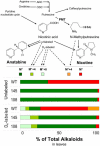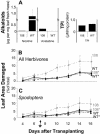Nicotine's defensive function in nature
- PMID: 15314646
- PMCID: PMC509292
- DOI: 10.1371/journal.pbio.0020217
Nicotine's defensive function in nature
Erratum in
- PLoS Biol. 2004 Oct;2(10):e382
Abstract
Plants produce metabolites that directly decrease herbivore performance, and as a consequence, herbivores are selected for resistance to these metabolites. To determine whether these metabolites actually function as defenses requires measuring the performance of plants that are altered only in the production of a certain metabolite. To date, the defensive value of most plant resistance traits has not been demonstrated in nature. We transformed native tobacco(Nicotiana attenuata) with a consensus fragment of its two putrescine N-methyl transferase (pmt) genes in either antisense or inverted-repeat (IRpmt) orientations. Only the latter reduced (by greater than 95%) constitutive and inducible nicotine. With D(4)-nicotinic acid (NA), we demonstrate that silencing pmt inhibits nicotine production, while the excess NA dimerizes to form anatabine. Larvae of the nicotine-adapted herbivore Manduca sexta (tobacco hornworm) grew faster and, like the beetle Diabrotica undecimpunctata, preferred IRpmt plants in choice tests. When planted in their native habitat, IRpmt plants were attacked more frequently and, compared to wild-type plants, lost 3-fold more leaf area from a variety of native herbivores, of which the beet armyworm, Spodoptera exigua, and Trimerotropis spp. grasshoppers caused the most damage. These results provide strong evidence that nicotine functions as an efficient defense in nature and highlights the value of transgenic techniques for ecological research.
Conflict of interest statement
The authors have declared that no conflicts of interest exist.
Figures




References
-
- Appel HM, Martin MM. Significance of metabolic load in the evolution of host specificity in Manduca sexta . Ecology. 1992;73:216–228.
-
- Baldwin IT. Short-term damage-induced increases in tobacco alkaloids protect plants. Oecologia. 1988;75:367–370. - PubMed
-
- Barbosa P, Saunders JA, Kemper J, Trumbule R, Olechno J, et al. Plant allelochemicals and insect parasitoids effects of nicotine on Cotesia congregata (Say) (Hymenoptera, Braconidae) and Hyposoter annulipes (Cresson) (Hymenoptera, Ichneumonidae) J Chem Ecol. 1986;12:1319–1328. - PubMed
-
- Bell EA. Secondary compounds and insect herbivores. In: Labeyrie V, Fabres G, Lachaise D, editors. Insects-plants: Proceedings of the 6th international symposium on insect-plant relationships (PAU 1986) The Hague: Dr. W. Junk Publishers; 1987. pp. 19–23.
Publication types
MeSH terms
Substances
Associated data
- Actions
- Actions
- Actions
- Actions
- Actions
LinkOut - more resources
Full Text Sources
Other Literature Sources
Miscellaneous

